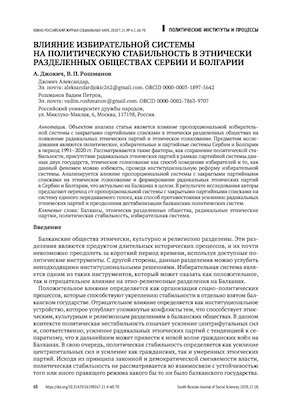Abstract
The article focuses on the influence of the proportional electoral system with closed party lists in ethnically divided societies on the emergence of radical ethnic parties and on ethnic voting. The subject of the study is the political, electoral and party systems of Serbia and Bulgaria between 1991 and 2020. The following factors are considered: preservation of political stability, presence of radical ethnic parties within the party systems of the two states, and ethnic voting as a mode of conduct for voters, as well as the way to evade the phenomenon undertaking an institutional reform of the electoral system. The impact of a proportional system with closed party lists on ethnic voting and the formation of radical ethnic parties in Serbia and Bulgaria is analyzed, which is relevant in the Balkans as a whole. As a result of the study, the authors propose a shift from a proportional system with closed party lists to a single transferable vote system as a way of countering the rise of radical ethnic parties and of overcoming the destabilization of Balkan political systems.
Keywords
References
- Aspekty izbiratel’nykh reform v nachale bolgarskogo perekhoda [Aspects of Electoral Reforms at the Beginning of Bulgarian transition] (2018). In Yubileinyi sbornik v chest’ prof. Todora Taneva [Anniversary Collection of Papers in Honor of Prof. Todor Tanev] (pp. 359–369), Sofiya.
- Dawn, B. (2009). Peace by Design: Managing Intrastate Conflict through Decentralization. Oxford: Oxford University Press.
- Fagersholm, A. (2016). Ethnic and Regionalist Parties in Western Europe: A Party Family? Studies in Ethnicity and Nationalism, 16(2), 322–323.
- Farukshin, M. Kh. (2016). Problema etnicheskogo golosovaniia v zarubezhnom diskurse [The Problem of Ethnic Voting in Foreign Discourse]. Sotsiologicheskie issledovaniia [Sociological Studies], 5, 80–86.
- Flores Juberías, C. (2000). Post-Communist Electoral Systems and National Minorities: A Dilemma in Five Paradigms. In Jonathan P. Stein (Ed.) The Politics of National Minority Participation in Post-Communist Europe: State-Building, Democracy, and Ethnic Mobilization (pp. 31–64). Armonk: M. E. Sharpe.
- Ganev, I. (2004). History, Politics and the Constitution: Ethnic Conflict and Constitutional Adjudication in Postcommunist Bulgaria. Slavic Review, 63(1), 66–89.
- Horowitz, D. (1994). Democracy in Divided Societies. In L. Diamond and M. F. Plattner (Eds). Nationalism, Ethnic Conflict, and Democracy (pp. 35–55). Baltimore: The Johns Hopkins University Press.
- Lijphart, A. (1994). Electoral Systems and Party Systems: A Study of Twenty-Seven Democracies, 1945–1990. Oxford: Oxford University Press.
- Mitchell, P. (2014). The Single Transferable Vote and Ethnic Conflict: The Evidence from Northern Ireland. Electoral Studies, 33, 246–257.
- Reilly, B., Maley, M. (2000). The Single Transferable Vote and the Alternative Vote Compared. In S. Bowler and B. Grofman (Eds.) Elections in Australia, Ireland, and Malta under the Single Transferable Vote: Reflections on an Embedded Institution (pp. 37–58). Ann Arbor Michigan: University of Michigan Press.
- Spirova, M. (2016). The Movement for Rights and Freedoms in Bulgaria: Beyond the Ethnic Vote. In S. Ramet & M. Valenta (Eds.) Ethnic Minorities and Politics in Post-Socialist Southeastern Europe (pp. 154–169). Cambridge: Cambridge University Press.
- Stefanova, B. (2012). Between Ethnopolitics and Liberal Centrism: The Movement for Rights and Freedoms in the Mainstream of Bulgarian Party Politics. Nationalities Papers, 40(5), 767–782.
 Русский
Русский


